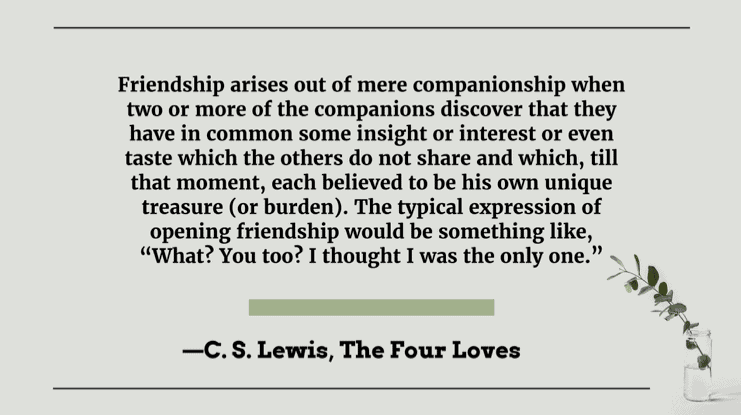C. S. Lewis quotes from the author’s popular fantasy and apologetics books, like the beloved Chronicles of Narnia series, The Screwtape Letters, and Mere Christianity might just be some of the most oft-referenced quotes for Christians.
Born Clive Staples Lewis in 1898, C. S. Lewis was a prolific writer who professed atheism as a teenager and resisted belief in Jesus for some time. Before he became a Christian, he published Spirits in Bondage: A Cycle of Lyrics, a book of poetry which reveals a great deal about his pre-conversion spiritual state. He converted to Christianity through the influence of close friends J.R.R. Tolkien and Hugo Dyson and after reading the works of George MacDonald, G.K. Chesterton, and others who challenged his beliefs about God and the meaning of life.
His newfound faith redirected his life and most notably, his writing. This British author and Oxford and Cambridge University literature professor went on to write 75 books before his death in 1963, including The Pilgrim’s Regress—his first major work after his conversion that documented his search for meaning and spiritual satisfaction that eventually lead him to Christianity.
Below are popular C. S. Lewis quotes on love, life, friendship, God, and more.
Table of contents
- C. S. Lewis on love
- C. S. Lewis on belief and faith
- C. S. Lewis on God
- C. S. Lewis on heaven & hell
- C. S. Lewis on courage
- C. S. Lewis on happiness
- C. S. Lewis on life
- C. S. Lewis on death
- C. S. Lewis on forgiveness
- C. S. Lewis on friendship
- C. S. Lewis on reading, writing, and literature
- C. S. Lewis on sin
- C. S. Lewis on salvation
- C. S. Lewis on conversion
- C. S. Lewis on generosity
- C. S. Lewis on free will
- C. S. Lewis on humility
- C. S. Lewis on miracles
- C. S. Lewis on grief, pain, suffering, and trials
C. S. Lewis on love
There is no safe investment. To love at all is to be vulnerable. Love anything, and your heart will certainly be wrung and possibly be broken. If you want to make sure of keeping it intact, you must give your heart to no one, not even to an animal. Wrap it carefully round with hobbies and little luxuries; avoid all entanglements; lock it up safe in the casket or coffin of your selfishness. But in that casket—safe, dark, motionless, airless—it will change. It will not be broken; it will become unbreakable, impenetrable, irredeemable. The alternative to tragedy, or at least to the risk of tragedy, is damnation. The only place outside Heaven where you can be perfectly safe from all the dangers and perturbations of love is Hell. —C. S. Lewis, The Four Loves
Love is something more stern and splendid than mere kindness. —C. S. Lewis, The Problem of Pain
Love is not an affectionate feeling but a steady wish for the loved person’s ultimate good as far as it can be obtained. —C. S. Lewis, God in the Dock: Essays on Theology and Ethics
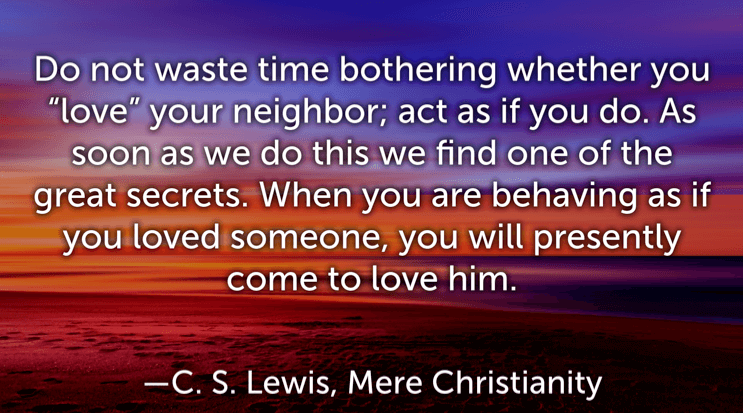
Do not waste time bothering whether you “love” your neighbor; act as if you do. As soon as we do this we find one of the great secrets. When you are behaving as if you loved someone, you will presently come to love him. —C. S. Lewis, Mere Christianity
This is one of the miracles of love: It gives a power of seeing through its own enchantments and yet not being disenchanted. —C. S. Lewis, A Grief Observed
When they have really learned to love their neighbors as themselves, they will be allowed to love themselves as their neighbors. —C. S. Lewis, The Screwtape Letters
Love may forgive all infirmities and love still in spite of them: but Love cannot cease to will their removal. —C. S. Lewis, The Problem of Pain
C. S. Lewis on belief and faith
You never know how much you really believe anything until its truth or falsehood becomes a matter of life and death to you. —C. S. Lewis, A Grief Observed
What can you ever really know of other people’s souls—of their temptations, their opportunities, their struggles? One soul in the whole of creation you do know: and it is the only one whose fate is placed in your hands. If there is a God, you are, in a sense, alone with him. —C. S. Lewis, Mere Christianity
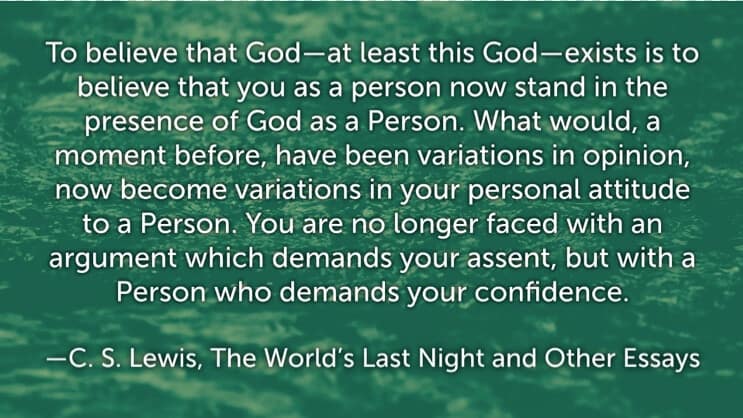
To believe that God—at least this God—exists is to believe that you as a person now stand in the presence of God as a Person. What would, a moment before, have been variations in opinion, now become variations in your personal attitude to a Person. You are no longer faced with an argument which demands your assent, but with a Person who demands your confidence. —C. S. Lewis, The World’s Last Night and Other Essays
The controversy about faith and works is one that has gone on for a very long time, and it is a highly technical matter. I personally rely on the paradoxical text: “Work out your own salvation . . . for it is God that worketh in you.” It looks as if in one sense we do nothing, and in another case, we do a damned lot. “Work out your own salvation with fear and trembling,” but you must have it in you before you can work it out. —C. S. Lewis, God in the Dock: Essays on Theology and Ethics
In science we have been reading only the notes to a poem; in Christianity, we find the poem itself. —C. S. Lewis, Miracles
Everyone who believes in God at all believes that he knows what you and I are going to do tomorrow. —C. S. Lewis, The Business of Heaven: Daily Readings from C. S. Lewis
Unless human reasoning is valid, no science can be true.
—C. S. Lewis, Miracles
I believe in Christianity as I believe that the Sun has risen, not only because I see it, but because by it I see everything else. —C. S. Lewis, The Weight of Glory
C. S. Lewis on God
Whatever you do, he will make good of it. But not the good he had prepared for you if you had obeyed Him. —C. S. Lewis, “Ransom,” in Perelandra
God has no needs. Human love, as Plato teaches us, is the child of Poverty—of want or lack; it is caused by a real or supposed good in its beloved which the lover needs and desires. But God’s love, far from being caused by goodness in the object, causes all the goodness which the object has, loving it first into existence and then into real, though derivative, loveability. God is Goodness. He can give good, but cannot need or get it. In that sense all His love is, as it were, bottomlessly selfless by very definition; it has everything to give and nothing to receive. —C. S. Lewis, The Problem of Pain
My idea of God is not a divine idea. It has to be shattered time after time. He shatters it himself. C. S. Lewis, A Grief Observed
I don’t doubt that the Holy Spirit guides your decisions from within when you make them with the intention of pleasing God. The error would be to think that he speaks only within, whereas in reality, he speaks also through Scripture, the Church, Christian friends, books etc. —C. S. Lewis, Letters of C. S. Lewis
To walk out of his will is to walk into nowhere. —C. S. Lewis, Perelandra
God is not merely good, but goodness; goodness is not merely divine, but God. —C. S. Lewis, Christian Reflections, “The Poison of Subjectivism”
We say that God is “infinite.” In the sense that His knowledge and power extend not to some things but to all, this is true. But if by using the word “infinite” we encourage ourselves to think of Him as a formless “everything” about whom nothing in particular and everything, in general, is true, then it would be better to drop that word altogether. Let us dare to say that God is a particular Thing. Once He was the only Thing: but He is creative, He made other things to be. He is not those other things. He is not “universal being”: if He were there would be no creatures, for a generality can make nothing. He is “absolute being”—or rather the Absolute Being—in the sense that He alone exists in His own right. —C. S. Lewis, Miracles
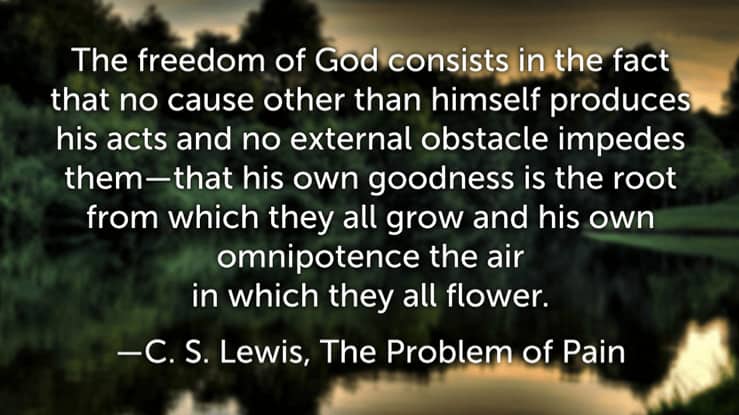
The freedom of God consists in the fact that no cause other than himself produces his acts and no external obstacle impedes them—that his own goodness is the root from which they all grow and his own omnipotence the air in which they all flower. —C. S. Lewis, The Problem of Pain
God is basic Fact or Actuality, the source of all other facthood. At all costs, therefore, he must not be thought of as a featureless generality. If he exists at all, he is the most concrete thing there is, the most individual, “organized and minutely articulated.” He is unspeakable not by being indefinite but by being too definite for the unavoidable vagueness of language. —C. S. Lewis, Miracles
“Aslan . . . you’re bigger.”
“That is because you are older, little one,” answered he.
“Not because you are?”
“I am not. But every year you grow, you will find me bigger.” —C. S. Lewis, Prince Caspian
There are two kinds of people: those who say to God, “thy will be done,” and those to whom God says, “All right, then, have it your way.” —C. S. Lewis, The Great Divorce
We are not necessarily doubting that God will do the best for us; we are wondering how painful the best will turn out to be. —C. S. Lewis, Letters of C. S. Lewis
The question is not what we intended ourselves to be but what he intended us to be when he made us. —C. S. Lewis, Mere Christianity
Do not let us deceive ourselves. No possible complexity which we can give to our picture of the universe can hide us from God: there is no copse, no forest, no jungle thick enough to provide cover. —C. S. Lewis, God in the Dock: Essays on Theology and Ethics
Our whole being by its very nature is one vast need; incomplete, preparatory, empty yet cluttered, crying out for him who can untie things that are now knotted together and tie up things that are still dangling loose. —C. S. Lewis, The Four Loves
The infinite value of each human soul is not a Christian doctrine. God did not die for man because of some value he perceived in him. The value of each human soul considered simply in itself, out of relation to God, is zero. As St. Paul writes, to have died for valuable men would have been not divine but merely heroic; but God died for sinners. He loved us not because we were lovable, but because he is Love. —C. S. Lewis, The Weight of Glory
The humblest of us, in a state of Grace, can have some “knowledge-by-acquaintance” (con-naitre), some “tasting,” of Love Himself; but man even at his highest sanctity and intelligence has no direct “knowledge about” (savoir) the ultimate Being—only analogies. We cannot see light, though by light we can see things. Statements about God are extrapolations from the knowledge of other things which the divine illumination enables us to know. —C. S. Lewis, The Four Loves
We may ignore, but we can nowhere evade, the presence of God. The world is crowded with Him. He walks everywhere incognito. And the incognito is not always hard to penetrate. The real labour is to remember, to attend. In fact, to come awake. Still more, to remain awake. —C. S. Lewis, Letters to Malcolm: Chiefly on Prayer
C. S. Lewis on heaven & hell
If I find in myself a desire which no experience in this world can satisfy, the most probable explanation is that I was made for another world. —C. S. Lewis, Mere Christianity
We are afraid that heaven is a bribe, and that if we make it our goal we shall no longer be disinterested. It is not so. Heaven offers nothing that a mercenary soul can desire. It is safe to tell the pure in heart that they shall see God, for only the pure in heart want to. —C. S. Lewis, The Problem of Pain
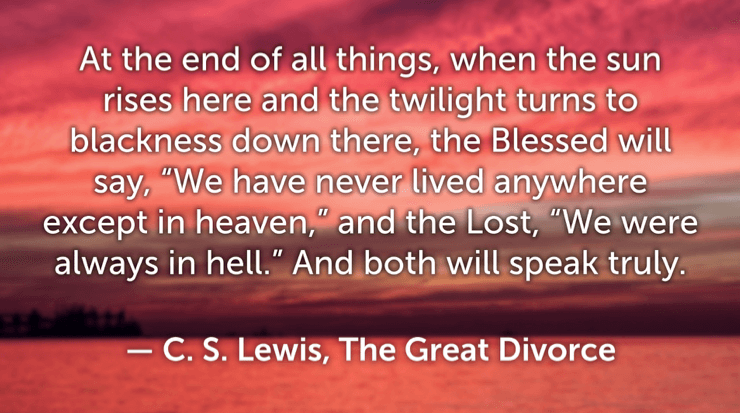
At the end of all things, when the sun rises here and the twilight turns to blackness down there, the Blessed will say, “We have never lived anywhere except in heaven,” and the Lost, “We were always in hell.” And both will speak truly. —C. S. Lewis, The Great Divorce
“Then those people are right who say that heaven and hell are only states of mind?”
“Hush,” said he sternly. “Do not blaspheme. Hell is a state of mind—ye never said a truer word. And every state of mind, left to itself, every shutting up of the creature within the dungeon of its own mind—is, in the end, hell. But heaven is not a state of mind. Heaven is reality itself. All that is fully real is heavenly. For all that can be shaken will be shaken and only the unshakable remains.” —C. S. Lewis, The Great Divorce
But God will look to every soul like its first love because he is its first love. Your place in heaven will seem to be made for you and you alone because you were made for it—made for it stitch by stitch as a glove is made for a hand. — C.S. Lewis, The Problem of Pain
Most of us find it very difficult to want “Heaven” at all—except in so far as “heaven” means meeting again our friends who have died. One reason for this difficulty is that we have not been trained: our whole education tends to fix our minds on this world. Another reason is that when the real want for heaven is present in us, we do not recognize it. Most people, if they had really learned to look into their own hearts, would know that they do want, and want acutely, something that cannot be had in this world. There are all sorts of things in this world that offer to give it to you, but they never quite keep their promise. —C. S. Lewis, Mere Christianity
Indeed the safest road to hell is the gradual one—the gentle slope, soft underfoot, without sudden turnings, without milestones, without signposts. — C.S. Lewis, The Screwtape Letters
I live in the Managerial Age, in a world of ‘Admin.’ The greatest evil is not now done in those sordid ‘dens of crime’ that Dickens loved to paint. It is not done even in concentration camps and labor camps. In those we see its final result. But it is conceived and ordered (moved, seconded, carried, and minuted) in clean, carpeted, warmed and well-lighted offices, by quiet men with white collars and cut fingernails and smooth-shaven cheeks who do not need to raise their voices. Hence, naturally enough, my symbol for hell is something like the bureaucracy of a police state or the office of a thoroughly nasty business concern. —C. S. Lewis, The Screwtape Letters
About hell. All I have ever said is that the N.T. [New Testament] plainly implies the possibility of some being finally left in “the outer darkness.” Whether this means (horror of horror) being left to a purely mental existence, left with nothing at all but one’s own envy, prurience, resentment, loneliness & self-conceit, or whether there is still some sort of environment, something you cd. call a world or a reality, I wd. never pretend to know. But I wouldn’t put the question in the form “do I believe in an actual hell.” One’s own mind is actual enough. If it doesn’t seem fully actual now that is because you can always escape from it a bit into the physical world—look out of the window, smoke a cigarette, go to sleep. But when there is nothing for you but your own mind (no body to go to sleep, no books or landscape, nor sounds, no drugs) it will be as actual as—as—well, as a coffin is actual to a man buried alive. —C. S. Lewis, The Letters of C. S. Lewis to Arthur Greeves
C. S. Lewis on courage
Courage, dear heart. —C. S. Lewis, The Voyage of the Dawn Treader
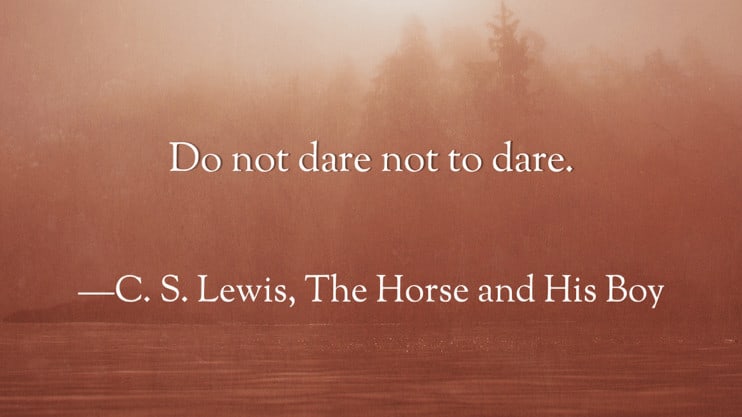
Do not dare not to dare. —C. S. Lewis, The Horse and His Boy
Courage is not simply one of the virtues but the form of every virtue at the testing point. —C. S. Lewis, The Screwtape Letters
C. S. Lewis on happiness
Do not let your happiness depend on something you may lose. —C. S. Lewis, The Four Loves
If you think of this world as a place intended simply for our happiness, you find it quite intolerable: think of it as a place of training and correction and it’s not so bad. —C. S. Lewis, God in the Dock: Essays on Theology and Ethics
God designed the human machine to run on Himself. He Himself is the fuel our spirits were designed to burn, or the food our spirits were designed to feed on. There is no other. That is why it is just no good asking God to make us happy in our own way without bothering about religion. God cannot give us a happiness and peace apart from Himself, because it is not there. There is no such thing. —C. S. Lewis, Mere Christianity
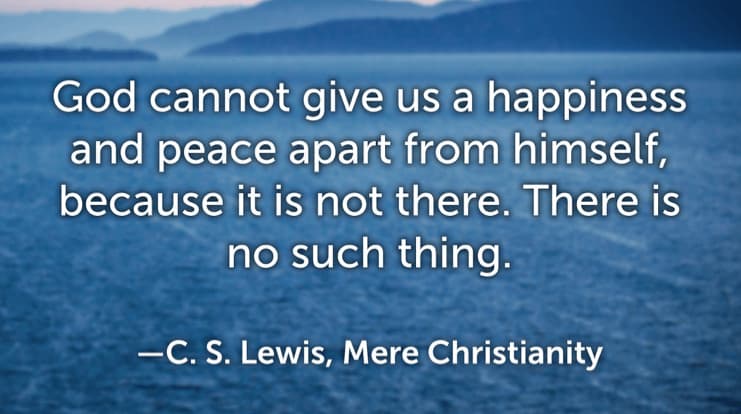
God cannot give us a happiness and peace apart from himself, because it is not there. There is no such thing. —C. S. Lewis, Mere Christianity
A “right to happiness” . . . sounds to me as odd as a right to good luck. For I believe—whatever one school of moralists may say—that we depend for a very great deal of our happiness or misery on circumstances outside all human control. A right to happiness doesn’t, for me, make much more sense than a right to be six feet tall, or to have a millionaire for your father, or to get good weather whenever you want to have a picnic. —C. S. Lewis, God in the Dock: Essays on Theology and Ethics
C. S. Lewis on life
For the Present is the point at which time touches eternity. —C.S. Lewis, The Screwtape Letters
All mortals tend to turn into the thing they are pretending to be. This is elementary. —C.S. Lewis, The Screwtape Letters
The people who keep asking if they can’t lead a decent life without Christ don’t know what life is about. —C.S. Lewis, God in the Dock: Essays on Theology and Ethics
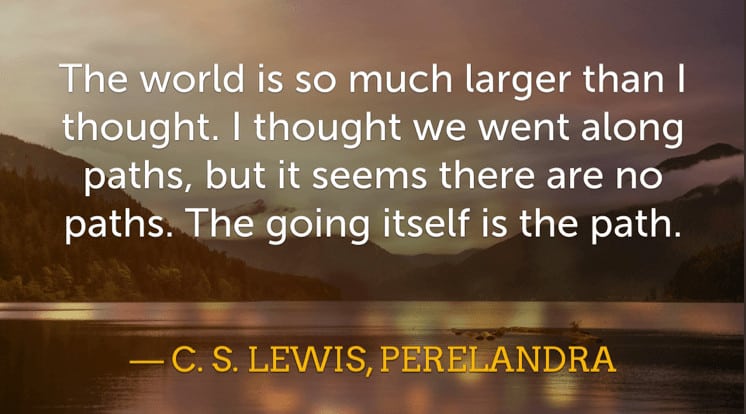
The world is so much larger than I thought. I thought we went along paths, but it seems there are no paths. The going itself is the path. —C. S. Lewis in Perelandra
‘And who are all these young men and women on each side?’
‘They are her sons and daughters.’
‘She must have had a very large family, Sir.’
‘Every young man or boy that met her became her son—even if it was only the boy that brought the meat to her back door. Every girl that met her was her daughter.’
‘Isn’t that a bit hard on their own parents?’
‘No. There are those that steal other people’s children. But her motherhood was of a different kind. Those on whom it fell went back to their natural parents loving them more… Every beast and bird that came near her had its place in her love. In her they became themselves. And now the abundance of life she has in Christ from the Father flows over into them. . . . Already there is joy enough in the little finger of a great saint such as yonder lady to waken all the dead things of the universe into life.’ —C. S. Lewis, The Great Divorce
If there lurks in most modern minds the notion that to desire our own good and earnestly to hope for the enjoyment of it is a bad thing, I submit that this notion has crept in from Kant and the Stoics and is no part of the Christian faith. Indeed, if we consider the unblushing promises of reward and the staggering nature of the rewards promised in the Gospels, it would seem that Our Lord finds our desires not too strong, but too weak. We are half-hearted creatures, fooling about with drink and sex and ambition when infinite joy is offered us, like an ignorant child who wants to go on making mud pies in a slum because he cannot imagine what is meant by the offer of a holiday at the sea. We are far too easily pleased. —C. S. Lewis, The Weight of Glory
C. S. Lewis on death
The world, knowing how all our real investments are beyond the grave, might expect us to be less concerned than other people who go in for what is called Higher Thought and tell us that “death doesn’t matter”; but we “are not high-minded,” and we follow One who stood and wept at the grave of Lazarus—not surely, because he was grieved that Mary and Martha wept, and sorrowed for their lack of faith (though some thus interpret) but because death, the punishment of sin, is even more horrible in His eyes than in ours. —C. S. Lewis, God in the Dock: Essays on Theology and Ethics
On the one hand, Death is the triumph of Satan, the punishment of the Fall, and the last enemy. Christ shed tears at the grave of Lazarus and sweated blood in Gethsemane: the Life of Lives that was in Him detested this penal obscenity not less than we do, but more. On the other hand, only he who loses his life will save it. We are baptized into the death of Christ, and it is the remedy for the Fall. Death is, in fact, what some modern people call “ambivalent.” It is Satan’s great weapon and also God’s great weapon: it is holy and unholy; our supreme disgrace and our only hope; the thing Christ came to conquer and the means by which he conquered. —C. S. Lewis, Miracles
“There was a real railway accident,” said Aslan softly. “Your father and mother and all of you are—as you used to call it in the Shadow-Lands—dead. The term is over: the holidays have begun. The dream is ended: this is the morning.” And as He spoke He no longer looked to them like a lion; but the things that began to happen after that were so great and beautiful that I cannot write them. And for us this is the end of all the stories, and we can most truly say that they all lived happily ever after. But for them it was only the beginning of the real story. All their life in this world and all their adventures in Narnia had only been the cover and the title page: now at last they were beginning Chapter One of the Great Story, which no one on earth has read: which goes on for ever: in which every chapter is better than the one before. —C. S. Lewis, The Last Battle
Only he who really lived a human life (and I presume that only one did) can fully taste the horror of death. —C. S. Lewis, Letters of C. S. Lewis
Death is a safety device because, once Man has fallen, natural immortality would be the one utterly hopeless destiny for him. —C. S. Lewis, Miracles
It is hard to have patience with people who say “There is no death” or “Death doesn’t matter.” There is death. And whatever is matters. And whatever happens has consequences, and it and they are irrevocable and irreversible. You might as well say that birth doesn’t matter. I look up at the night sky. Is anything more certain than that in all those vast times and spaces, if I were allowed to search them, I should nowhere find her face, her voice, her touch? She died. She is dead. Is the word so difficult to learn? —C.S. Lewis, A Grief Observed
C. S. Lewis on forgiveness
I think that if God forgives us we must forgive ourselves. Otherwise, it is almost like setting up ourselves as a higher tribunal than him. —C. S. Lewis, Letters of C. S. Lewis
We may, indeed, be sure that perfect chastity—like perfect charity—will not be attained by any merely human efforts. You must ask for God’s help. Even when you have done so, it may seem to you for a long time that no help, or less help than you need, is being given. Never mind. After each failure, ask forgiveness, pick yourself up, and try again. Very often what God first helps us towards is not the virtue itself but just this power of always trying again. For however important chastity (or courage, or truthfulness, or any other virtue) may be, this process trains us in habits of the soul which are more important still. It cures our illusions about ourselves and teaches us to depend on God. We learn, on the one hand, that we cannot trust ourselves even in our best moments, and, on the other, that we need not despair even in our worst, for our failures are forgiven. The only fatal thing is to sit down content with anything less than perfection. —C. S. Lewis, Mere Christianity
The demand that God should forgive such a man [one bent on evil] while he remains what he is, is based on a confusion between condoning and forgiving. To condone an evil is simply to ignore it, to treat it as if it were good. But forgiveness needs to be accepted as well as offered if it is to be complete: and a man who admits no guilt can accept no forgiveness. —C. S. Lewis, The Problem of Pain
We must forgive all our enemies or be damned. —C. S. Lewis, God in the Dock: Essays on Theology and Ethics

There is no use in talking as if forgiveness were easy. We all know the old joke, “You’ve given up smoking once; I’ve given it up a dozen times.” In the same way I could say of a certain man, “Have I forgiven him for what he did that day? I’ve forgiven him more times than I can count.” For we find that the work of forgiveness has to be done over and over again. —C. S. Lewis, Reflections on the Psalms
It is perhaps not so hard to forgive a single great injury. But to forgive the incessant provocations of daily life—to keep on forgiving the bossy mother-in-law, the bullying husband, the nagging wife, the selfish daughter, the deceitful son—how can we do it? Only, I think, by remembering where we stand, by meaning our words when we say in our prayers each night “Forgive us our trespasses as we forgive those that trespass against us.” We are offered forgiveness on no other terms. To refuse it is to refuse God’s mercy for ourselves. There is no hint of exceptions and God means what he says. —C. S. Lewis, The Weight of Glory
C. S. Lewis on friendship
The first and most obvious answer is that few value it because few experience it. And the possibility of going through life without the experience is rooted in that fact which separates Friendship so sharply from both the other loves. Friendship is—in a sense not at all derogatory to it—the least natural of loves; the least instinctive, organic, biological, gregarious and necessary. It has least commerce with our nerves; there is nothing throaty about it nothing that quickens the pulse or turns you red and pale. It is essentially between individuals; the moment two men are friends they have in some degree drawn apart together from the herd. —C. S. Lewis, The Four Loves
Hence true Friendship is the least jealous of loves. Two friends delight to be joined by a third, and three by a fourth, if only the newcomer is qualified to become a real friend. . . . In this, Friendship exhibits a glorious ‘nearness by resemblance’ to heaven itself where the very multitude of the blessed (which no man can number) increases the fruition which each has of God. For every soul, seeing him in her own way, doubtless communicates that unique vision to all the rest. —C. S. Lewis, The Four Loves
The next best thing to being wise oneself is to live in a circle of those who are. —C.S. Lewis, Selected Literary Essays, “Hamlet: The Prince or the Poem” (1942)
We picture lovers face to face but friends side by side; their eyes look ahead. —C. S. Lewis, The Four Loves
Friendship arises out of mere companionship when two or more of the companions discover that they have in common some insight or interest or even taste which the others do not share and which, till that moment, each believed to be his own unique treasure (or burden). The typical expression of opening friendship would be something like, “What? You too? I thought I was the only one.” —C. S. Lewis, The Four Loves
Friendship is unnecessary, like philosophy, like art, like the universe itself (for God did not need to create). It has no survival value; rather it is one of those things which give value to survival. —C. S. Lewis, The Four Loves
Friendship is something that raised us almost above humanity. This love, free from instinct, free from all duties but those which love has freely assumed, almost wholly free from jealousy, and free without qualification from the need to be needed, is eminently spiritual. It is the sort of love one can imagine between angels. —C. S. Lewis, The Four Loves
Lovers seek for privacy. Friends find this solitude about them, this barrier between them and the herd, whether they want it or not. —C. S. Lewis, The Four Loves
C. S. Lewis on reading, writing, and literature
Always try to use the language so as to make quite clear what you mean and make sure your sentence couldn’t mean anything else. —C. S. Lewis, Letters to Children
Never use abstract nouns when concrete ones will do. If you mean “more people died” don’t say “mortality rose.” —C. S. Lewis, Letters to Children
I can’t imagine a man really enjoying a book and reading it only once. —C.S. Lewis, Letter to Arthur Greeves
Always prefer the plain direct word to the long, vague one. Don’t implement promises, but keep them. —C. S. Lewis, Letters to Children
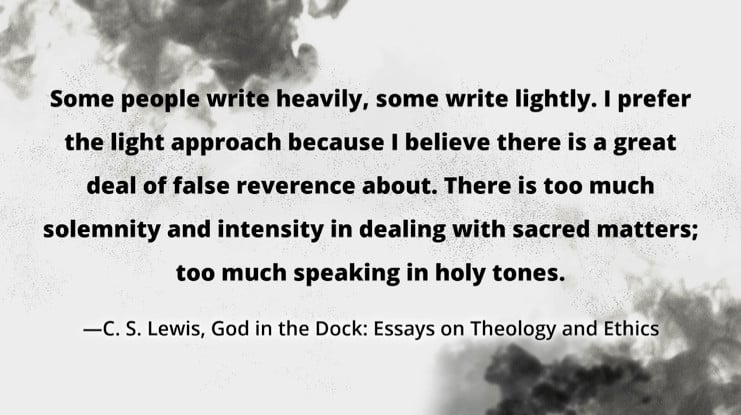
Some people write heavily, some write lightly. I prefer the light approach because I believe there is a great deal of false reverence about. There is too much solemnity and intensity in dealing with sacred matters; too much speaking in holy tones. —C. S. Lewis, God in the Dock: Essays on Theology and Ethics
“Yes,” my friend said. “I don’t see why there shouldn’t be books in heaven. But you will find that your library in heaven contains only some of the books you had on earth.”
“Which?” I asked.
“The ones you gave away or lent.”
“I hope the lent ones won’t still have all the borrowers’ dirty thumb marks,” said I.
“Oh yes they will,” said he. “But just as the wounds of the martyrs will have turned into beauties, so you will find that the thumb-marks have turned into beautiful illuminated capitals or exquisite marginal woodcuts.” —C. S. Lewis, God in the Dock: Essays on Theology and Ethics
C. S. Lewis on sin
The worst sins of men are spiritual. —C. S. Lewis, The Four Loves
I have found (to my regret) that the degrees of shame and disgust which I actually feel at my own sins do not at all correspond to what my reason tells me about their comparative gravity. . . . Our emotional reactions to our own behaviour are of limited ethical significance. —C. S. Lewis, Letters to Malcolm: Chiefly on Prayer
The sins of the flesh are bad, but they are the least bad of all sins. All the worst pleasures are purely spiritual: the pleasure of putting other people in the wrong, of bossing and patronising and spoiling sport, and back-biting; the pleasures of power, of hatred. For there are two things inside me, competing with the human self which I must try to become. They are the Animal self, and the Diabolical self. The Diabolical self is the worse of the two. That is why a cold, self-righteous prig who goes regularly to church may be far nearer to hell than a prostitute. But, of course, it is better to be neither. —C. S. Lewis, Mere Christianity
C. S. Lewis on salvation
“Please—Aslan,” said Lucy, “can anything be done to save Edmund?”
“All shall be done,” said Aslan. —C. S. Lewis, The Lion, the Witch and the Wardrobe,
The glory of God, and, as our only means to glorifying Him, the salvation of human souls, is the real business of life. —C. S. Lewis, Christian Reflections, “Christianity and Culture”
Christianity is not, in the long run, concerned either with individuals or communities . . . but a new creature. —C. S. Lewis, The Weight of Glory
What, then, is the difference which he [Jesus] has made to the whole human mass? It is just this; that the business of becoming a son of God, of being turned from a created thing into a begotten thing, of passing over from the temporary biological life into timeless “spiritual” life, has been done for us. Humanity is already “saved” in principle. We individuals have to appropriate that salvation. But the really tough work—the bit we could not have done for ourselves—has been done for us. We have not got to try to climb up into spiritual life by our own efforts; it has already come down into the human race. If we will only lay ourselves open to the one Man in whom it was fully present, and who, in spite of being God, is also a real man, he will do it in us and for us. —C. S. Lewis, Mere Christianity
Christ’s work of making New Men [is like] . . . turning a horse into a winged creature. . . . It is not mere improvement but Transformation. —C. S. Lewis, Mere Christianity
C. S. Lewis on conversion
Conversion requires an alteration of the will, and an alteration which, in the last resort, does not occur without the intervention of the supernatural. —C. S. Lewis, God in the Dock: Essays on Theology and Ethics
Dyson and Tolkien were the immediate human causes of my conversion. Is any pleasure on earth as great as a circle of Christian friends by a good fire? —C. S. Lewis, Letters of C. S. Lewis
As I drew near the conclusion, I felt a resistance almost as strong as my previous resistance to Theism. As strong, but shorter-lived, for I understood it better. Every step I had taken, from the Absolute to “Spirit” and from “Spirit” to “God,” had been a step toward the more concrete, the more imminent, the more compulsive. At each step one had less chance “to call one’s soul one’s own.” To accept the Incarnation was a further step in the same direction. It brings God nearer, or near in a new way. And this, I found, was something I had not wanted. But to recognize the ground for my evasion was of course to recognize both its shame and its futility. I know very well when, but hardly how, the final step was taken. I was driven to Whipsnade one sunny morning. When we set out I did not believe that Jesus Christ is the Son of God, and when we reached the zoo I did. Yet I had not exactly spent the journey in thought. Nor in great emotion. “Emotional” is perhaps the last word we can apply to some of the most important events. It was more like when a man, after long sleep, still lying motionless in bed, becomes aware that he is now awake. And it was, like that moment on top of the bus, ambiguous. Freedom, or necessity? Or do they differ at their maximum? At that maximum a man is what he does; there is nothing of him left over or outside the act. —C. S. Lewis, Surprised by Joy
It costs God nothing, so far as we know, to create nice things: but to convert rebellious wills cost Him crucifixion. —C. S. Lewis, Mere Christianity
In the Trinity Term of 1929 I gave in, and admitted that God was God, and knelt and prayed; perhaps, that night, the most dejected and reluctant convert in all England. I did not then see what is now the most shining and obvious thing; the Divine humility which will accept a convert even on such terms. The Prodigal Son at least walked home on his own feet. But who can duly adore that Love which will open the high gates to a prodigal who is brought in kicking, struggling, resentful, and darting his eyes in every direction for a chance of escape? The words compelle intrare, compel them to come in, have been so abused by wicked men that we shudder at them; but, properly understood, they plumb the depth of the Divine mercy. The hardness of God is kinder than the softness of men, and His compulsion is our liberation. —C. S. Lewis, Surprised by Joy
C. S. Lewis on generosity
All our offerings, whether of music or martyrdom, are like the intrinsically worthless present of a child, which a father values indeed, but values only for the intention. —C. S. Lewis, Christian Reflections, “On Church Music”
Charity—giving to the poor—is an essential part of Christian morality. . . . I do not believe one can settle how much we ought to give. I am afraid the only safe rule is to give more than we can spare. In other words, if our expenditure on comforts, luxuries, amusements, etc., is up to the standard common among those with the same income as our own, we are probably giving away too little. If our charities do not at all pinch or hamper us, I should say they are too small. There ought to be things we should like to do and cannot do because our charitable expenditure excludes them. —C. S. Lewis, Mere Christianity
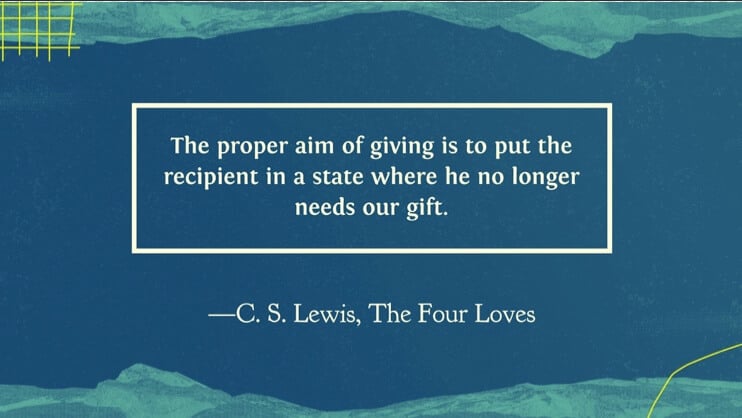
The proper aim of giving is to put the recipient in a state where he no longer needs our gift. —C. S. Lewis, The Four Loves
The limit of giving is to be the limit of our ability to give. —C. S. Lewis, English Literature in the Sixteenth Century, Introduction
C. S. Lewis on free will
The sin, both of men and of angels, was rendered possible by the fact that God gave them free will; thus surrendering a portion of His omnipotence (it is again a deathlike or descending movement) because he saw that from a world of free creatures, even though they fell, he could work out (and this is the re-ascent) a deeper happiness and a fuller splendour than any world of automata would admit. —C. S. Lewis, Miracles
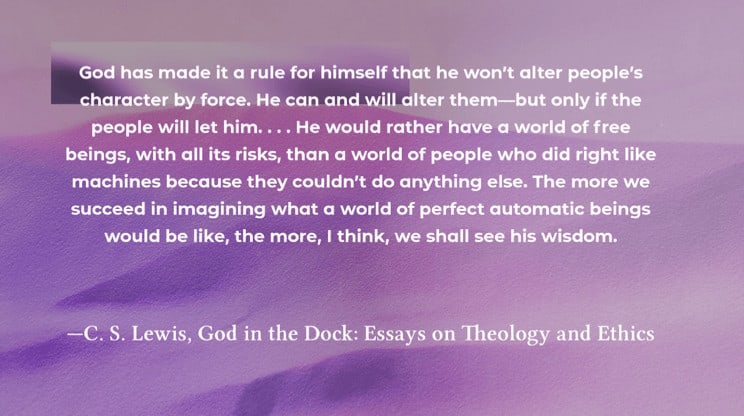
God has made it a rule for himself that he won’t alter people’s character by force. He can and will alter them—but only if the people will let him. . . . He would rather have a world of free beings, with all its risks, than a world of people who did right like machines because they couldn’t do anything else. The more we succeed in imagining what a world of perfect automatic beings would be like, the more, I think, we shall see his wisdom. —C. S. Lewis, God in the Dock: Essays on Theology and Ethics
“Ye can know nothing of the end of all things. . . .”
“Because they are too terrible, Sir?”
“No. Because all answers deceive. If ye put the question from within Time and are asking about possibilities, the answer is certain. The choice of ways is always before you. Neither is closed. Any man may choose eternal death. Those who choose it will have it. But if ye are trying to leap on into eternity, if ye are trying to see the final state of all things as it will be (for so ye must speak) when there are no more possibilities left but only the Real, then ye ask what cannot be answered to mortal ears. Time is the very lens through which ye see—small and clear, as men see through the wrong end of a telescope—something that would otherwise be too big for ye to see at all. That thing is Freedom: the gift whereby ye most resemble your Maker and are yourselves parts of eternal reality. But ye can see it only through the lens of Time, in a little clear picture, through the inverted telescope. . . . For every attempt to see the shape of eternity except through the lens of Time destroys your knowledge of Freedom. Witness the doctrine of Predestination which shows (truly enough) that eternal reality is not waiting for a future in which to be real; but at the price of removing Freedom which is the deeper truth of the two. And wouldn’t Universalism do the same? Ye cannot know eternal reality by a definition. Time itself, and all acts and events that fill Time, are the definition, and it must be lived.” —C. S. Lewis, The Great Divorce
Evil comes from the abuse of free will. —C. S. Lewis, The Problem of Pain
C. S. Lewis on humility
“You would not have called to me unless I had been calling to you,” said the Lion. —C. S. Lewis, The Silver Chair
I wonder what has happened. Are you ill—or away—or simply lazy? However, as you wrote to me so perseveringly during my silence (tho’ you must allow that mine was foretold and unavoidable) I will continue to write during yours: and also to prevent a bad habit of silence setting in on both sides. —The Collected Letters of C. S. Lewis, vol. 1
I love real mice. There are lots in my rooms in College but I never have set a trap. When I sit up late working they poke their heads out from behind the curtains just as if they were saying, “Hi! Time for you to go to bed. We want to come out and play.” —C. S. Lewis, The Collected Letters of C. S. Lewis, vol. 3
C. S. Lewis on miracles
Nothing can seem extraordinary until you have discovered what is ordinary. Belief in miracles, far from depending on an ignorance of the laws of nature, is only possible in so far as those laws are known. —C.S. Lewis, Miracles
Miracles in fact are a retelling in small letters of the very same story which is written across the whole world in letters too large for some of us to see. —C. S. Lewis, God in the Dock: Essays on Theology and Ethics
Miracles do not, in fact, break the laws of nature. —C.S. Lewis, Miracles
For this reason, the question [of] whether miracles occur can never be answered simply by experience. Every event which might claim to be a miracle is, in the last resort, something presented to our senses, something seen, heard, touched, smelled, or tasted. And our senses are not infallible. If anything extraordinary seems to have happened, we can always say that we have been the victims of an illusion. If we hold a philosophy that excludes the supernatural, this is what we always shall say. What we learn from experience depends on the kind of philosophy we bring to experience. It is therefore useless to appeal to experience before we have settled, as well as we can, the philosophical question. —C. S. Lewis, Miracles
C. S. Lewis on grief, pain, suffering, and trials
We were promised sufferings. They were part of the program. We were even told, ‘Blessed are they that mourn,’ and I accept it. I’ve got nothing that I hadn’t bargained for. Of course, it is different when the thing happens to oneself, not to others, and in reality, not imagination. —C.S. Lewis, A Grief Observed

God allows us to experience the low points of life in order to teach us lessons that we could learn no other way. —C. S. Lewis, The Problem of Pain
Pain insists upon being attended to. God whispers to us in our pleasures, speaks in our consciences, but shouts in our pains. It is his megaphone to rouse a deaf world. —C. S. Lewis, The Problem of Pain
God, who foresaw your tribulation, has specially armed you to go through it, not without pain but without stain. —C. S. Lewis, Collected Letters of C.S. Lewis
No one ever told me that grief felt so like fear. —C.S. Lewis, A Grief Observed
Mental pain is less dramatic than physical pain, but it is more common and also more hard to bear. The frequent attempt to conceal mental pain increases the burden: it is easier to say “My tooth is aching” than to say “My heart is broken.” —C. S. Lewis, The Problem of Pain
The real problem is not why some pious, humble, believing people suffer but why some do not. —C. S. Lewis, The Problem of Pain
Related articles
- 3 Reasons We Should Read C. S. Lewis’ Pre-Conversion Poems
- Why I Like C. S. Lewis
- C. S. Lewis’ Ingenious Apologetic of Longing
Related resources
- C.S. Lewis Collection
- Influences on the Thought of C. S. Lewis (6 hour course)
- Becoming C. S. Lewis: A Biography of Young Jack Lewis


